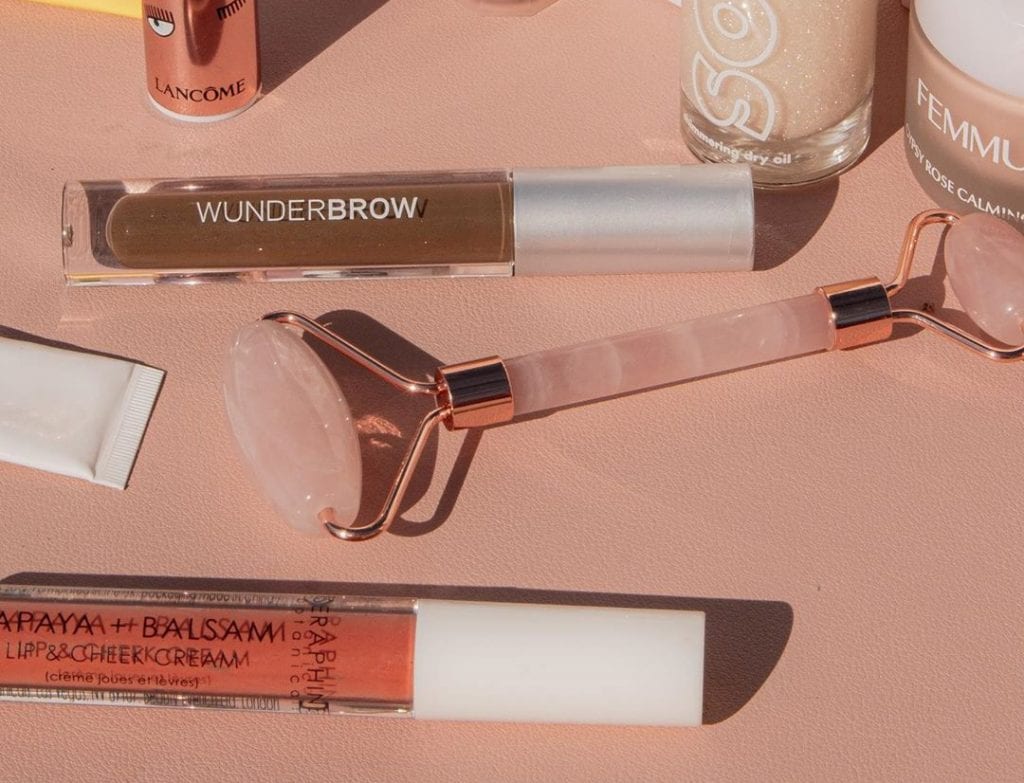Just two months after teaming up with Valentino to file a counterfeit lawsuit against sellers on its marketplace platform, Amazon has partnered with another brand – KF Beauty – to file a joint trademark action. According to the complaint that they filed on Wednesday in a federal court in Washington, Amazon and KF Beauty claim that four companies and 16 individuals are on the hook for selling counterfeit versions of KF Beauty’s WUNDER2 beauty products, including its best-selling WUNDERBROW eyebrow gels, on Amazon’s sweeping third-party marketplace site.
In the newly-filed lawsuit, Amazon and London-based KF Beauty assert that the defendants – Sirowl Technology, a Wyoming corporation; Shenzhen Mingyanfeng Tech Ltd., Topogrow, General Medi, and more than a dozen individuals – “conspired and operated in concert with each other to … advertise, market, offer, and sell counterfeit products as genuine WUNDER2 products to Amazon,” thereby, running afoul of KF Beauty’s federally registered trademarks.”
“From on or about August 8, 2018, to on or about October 30, 2018,” Amazon and KF Beauty claim that the defendants “advertised, marketed, offered, and sold counterfeit WUNDER2 products to Amazon, using KF Beauty’s registered trademarks, without authorization, to deceive Amazon and customers about the authenticity and origin of the products, and the products’ affiliation with WUNDER2.”
“By selling counterfeit WUNDER2 products,” which Amazon and KF Beauty purchased and confirmed were, in fact, fake, the defendants “falsely represented to Amazon and its customers that the products … were genuine products made by KF Beauty,” all while knowing that “they were prohibited from violating third-party IP rights or any applicable laws while selling products to Amazon.” In doing so, Amazon and KF Beauty claim that the defendants “deceived Amazon’s customers and Amazon, infringed and misused the intellectual property rights of KF Beauty, harmed the integrity of and customer trust in Amazon’s stores, and tarnished Amazon’s and KF Beauty’s brands.”
After receiving notice from KF Beauty and confirming the defendants’ “unlawful sale of counterfeit WUNDER2 products,” Amazon says that it “promptly blocked the defendants’ Vendor Accounts” in furtherance of “its rights under [the] Vendor Terms and Conditions” – which it requires all third-party vendors to sign before establishing a vendor account – “to protect its customers and its own brand.” Now, in addition to seeking monetary damages in connection with its claims of trademark infringement, false designation of origin, and violations of the Washington Consumer Protection Act, the latter of which prohibits unfair or deceptive business practices, Amazon and KF Beauty have asked the court to permanently enjoin the defendants from “selling products in any of Amazon’s stores; selling products to Amazon or any affiliate; [or] opening or attempting to open any Amazon Vendor or Selling Accounts,” as well as from using KF Beauty’s intellectual property without authorization.
Ultimately, while Amazon and KF Beauty set out their allegations in connection with the defendants’ alleged counterfeiting, the bulk of their 17-page complaint acts as a run-down of Amazon’s efforts when it comes to counterfeits, namely, its attempts “to build and protect its reputation as a store where customers can conveniently select from a wide array of authentic goods and services at competitive prices,” and how the actions of “a small number of bad actors seek to take advantage of the trust customers place in Amazon.”
In addition to identifying its various counterfeit-centric initiatives, including its several-years-old Brand Registry (“a free service that gives rights owners access to a powerful set of tools that helps them manage and protect their brand and intellectual property rights and report potentially infringing products,” which “more than 350,000 brands,” including KF Beauty, have enrolled in) and newer efforts like Project Zero, Amazon states that it “prohibits the sale of inauthentic and fraudulent products and is constantly innovating on behalf of customers and working with brands, manufacturers, rights owners, and others to improve the detection and prevention of counterfeit products ever being offered to customers through Amazon’s stores.”
The Seattle-based e-commerce titan asserts that it “invests vast resources to ensure that when customers make purchases through Amazon’s stores, either directly from Amazon or from one of its millions of third-party sellers, [they] receive authentic products made by the true manufacturer of those products,” and specifically points to its practice of “automatically and continuously scanning thousands of data points to detect and remove counterfeits from its stores and to terminate the Selling Accounts of bad actors before they can offer counterfeit products.”
In a statement in connection with the filing, Cristina Posa, Associate General Counsel and Director, Amazon Counterfeit Crimes Unit, said, “The majority of sellers in our store are law-abiding entrepreneurs, but we will take aggressive action to protect customers, brands, and our store from counterfeiters. Amazon and KF Beauty are holding these companies and individuals accountable and we appreciate the close cooperation we’ve had in this investigation.”
What is Really Going On?
The lawsuit comes amid ever-mounting criticism of Amazon by regulators and legislators (in the U.S. and beyond), and the Trump administration on anti-competition grounds and in connection with its role in the widespread availability of counterfeits in the U.S. Amazon appears to be trying to chip away at such scrutiny by way of an array of internal initiatives, such as Project Zero, as well as by way of an enduring public-facing campaign seeking to bolster consumer and brand confidence in the $1 trillion company. This includes lawsuits, such as the one at hand, as well as the Valentino suit, which are aimed at achieving the relevant monetary and equitable remedies in connection with the defendants, but maybe more importantly, these lawsuits stand to send a clear message to consumers and potential brand partners, alike, about Amazon’s stance when it comes to enforcement.
This does not appear to be all that different from the robust campaign that Alibaba launched years ago to in order to shed perceptions that its websites were riddled with fakes – a key to gaining a bigger international customer base and taking market share from global competitors, such as eBay and Amazon.com. As a result of its quest to not only boost consumer sentiment but also win over brands after being consistently plagued by claims of counterfeits saturating its group of e-commerce sites and being name-checked on the U.S. Trade Representative (“USTR”)’s annual “Notorious Markets” list, an annual blacklist of bad actors in intellectual property, the Chinese company has managed to lure luxury brands and their offerings – from La Mer skincare products and Valentino bags and ready-to-wear to Rimowa luggage – onto its specific luxury site.
Despite years of pushback from regulators and companies, including not one but two lawsuits filed against it by Kering – the Paris-based conglomerate that owns Gucci, Baenciaga, Bottega Veneta, and Alexander McQueen, among other luxury brands – on trademark infringement and counterfeiting grounds, Alibaba has seemingly managed to come out on the other side when it comes to many of its platforms (its TaoBao arm is still viewed as problematic by the USTR), and Amazon almost certainly hopes to benefit from a similar fate.
In terms of fashion and luxury brands, in particular, Amazon very well may be taking the same course of action. After all, it has tried – and save for some very recent exceptions, largely found it difficult – to win over fashion industry entities, with luxury giants like LVMH Moët Hennessy Louis Vuitton, for instance, explicitly swearing off potential partnerships with the $1 trillion retail behemoth, and pointing to the prevalence of “counterfeits” on its third-party marketplace as a key part of the issue. Against this background, the growing number of instances of Amazon partnering with brands to file suit are likely aimed at helping it to make a case that it is, in fact, an attractive partner for even the most highly protective luxury brands.
*The case is Amazon, Inc. and Kerafiber LLC dba KF Beauty v. Sirowl Technology, et al., 2:20-cv-01217 (W.D.Wash).











